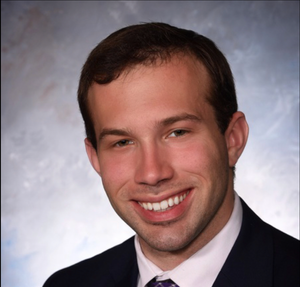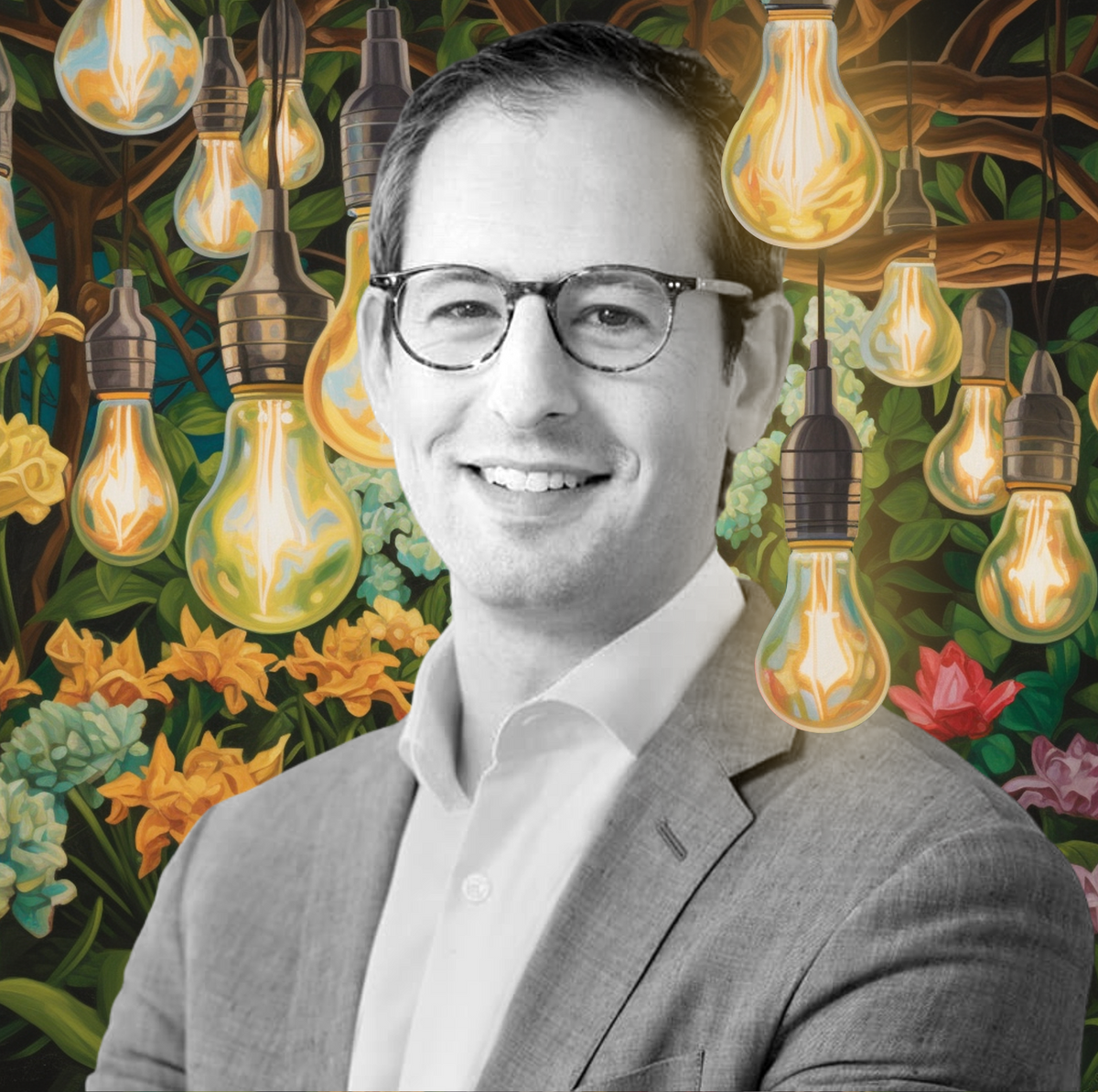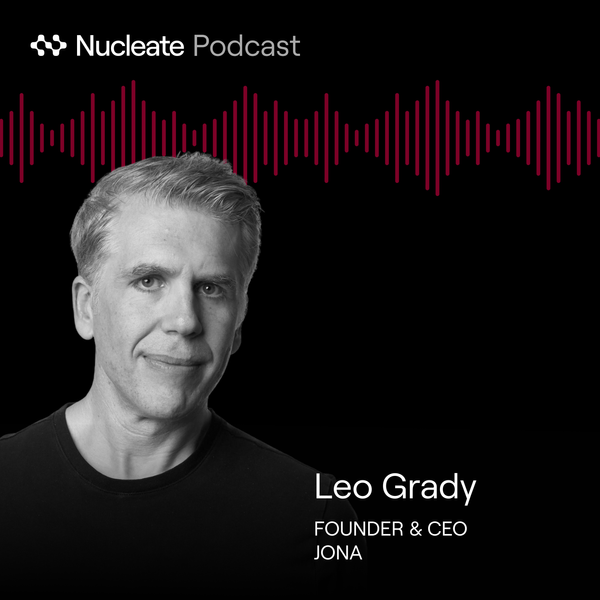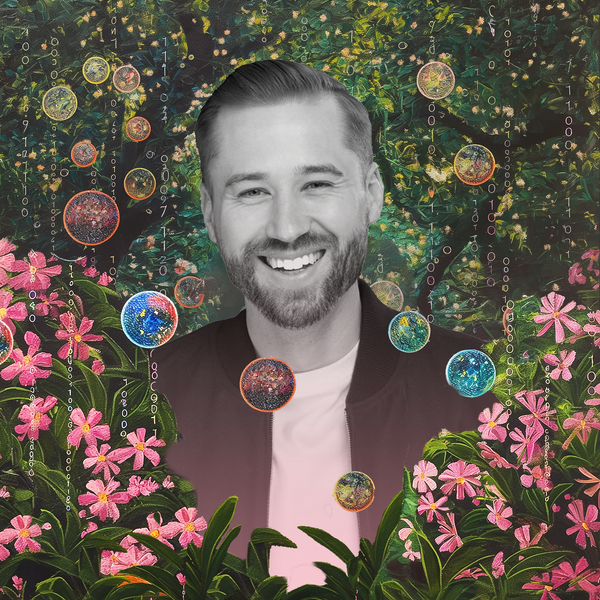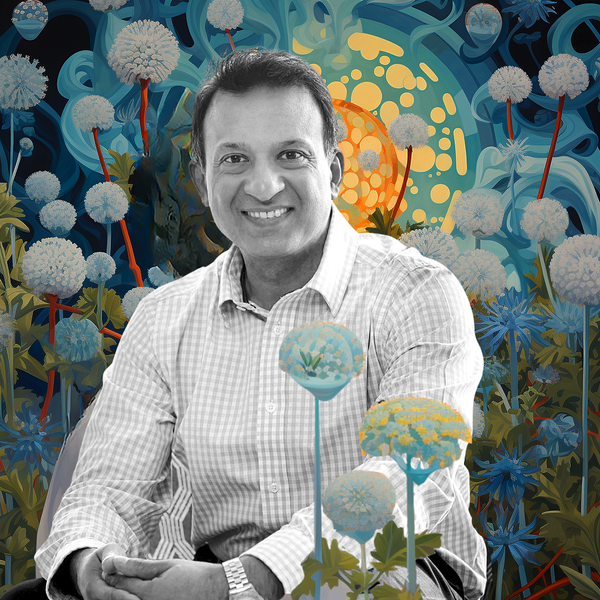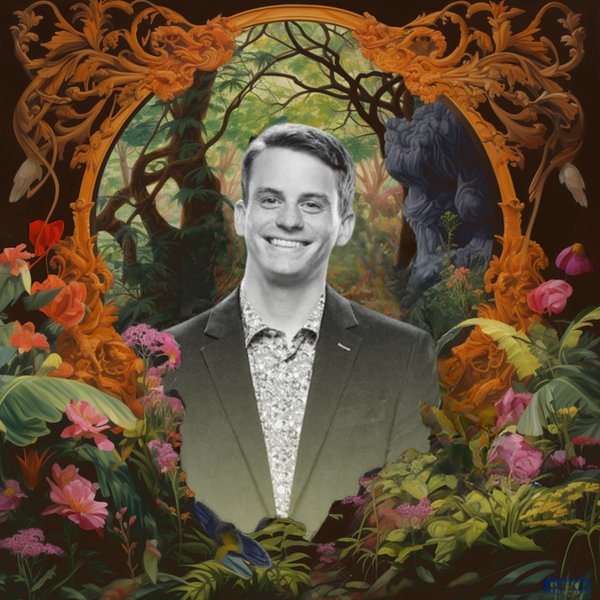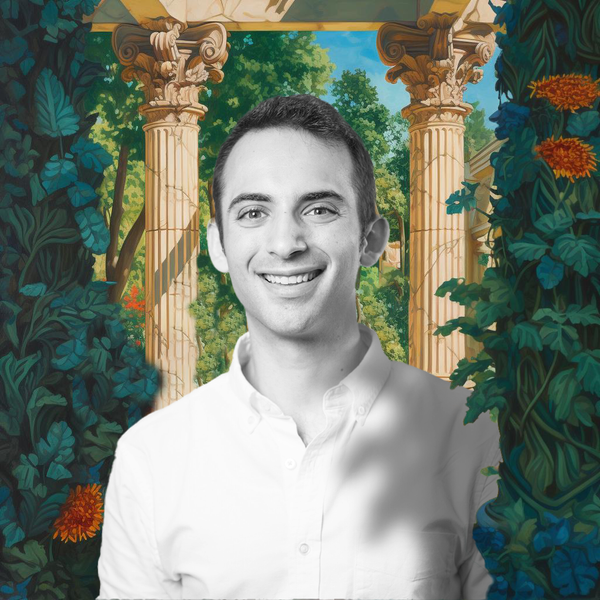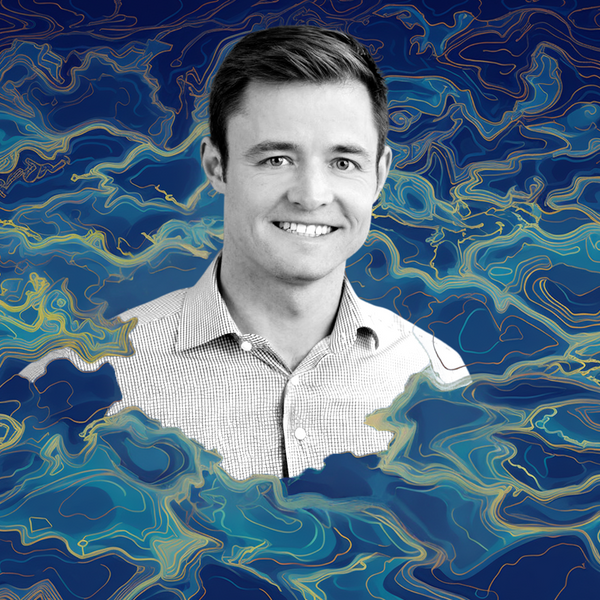Host: Sam Kessel MD, MBA
Summary
In this episode we speak with Brian Goodman, PhD, Partner at MPM Capital who was previously an associate at flagship pioneering, co-founder of Evelo biosciences, Aktis oncology, Renegade therapeutics, and Orna therapeutics. Brian talks about his scientific inspirations and the pivot from academic research to venture creation as well as the excitement and challenges that come with starting a biotech company. At MPM, Brian invests in and supports founders that are developing novel approaches to drug discovery and development.
Show Notes
- What sparked Dr. Goodman’s interest in biotech (0:00)
- Deciding to pivot from academia to venture capital (3:45)
- Failing fast and applying that mindset to science (9:44)
- Transitioning from academia to a start up (14:44)
- Advice for aspiring technical founders (20:03)
- Becoming an investor at MPM Capital (30:24)
- MPM’s investment thesis in oncology. (40:14)
Links
Transcript
Sam Kessel 00:00
Hi, everyone, and welcome to the nucleate signal podcast. My name is Sam Kessel. Today, we're thrilled to welcome Dr. Brian Goodman partner at MPM capital and previously an associate at flagship pioneering. And he was the co founder of Evelo biosciences, Aktis Oncology, and Renegade therapeutics. He also helped build on a therapeutics, Brian earned his bachelor's from Brandeis, and his PhD in biochemistry at Harvard Medical School in the rec Peterson lab. Welcome, Brian.
Brian Goodman 00:31
Thanks. Great to be here. Thanks for having me on, of course.
Sam Kessel 00:35
So to start, let's, let's get a little bit into your background. What initially sparked your interest in pursuing your PhD in biochemistry?
Brian Goodman 00:45
Yeah, so going back, I've always been interested in the sciences and was kind of a biotech brat. So my father was biomedical engineer. And I knew I wanted to pursue something creative in the sciences. And I kind of knew that the the PhD was the terminal degree. So I was pretty set on doing that. The other thing I always kind of knew I wanted to do is was more or less be the Steve Jobs of biotech. I thought that that would be kind of an interesting way of matching creativity, science technology to do something useful in the world. And from there was just kind of a logical approach of step one be really deep in the science, step two, step three start companies. And I kind of got lucky to muddle my way through step two and make it happen. So
Sam Kessel 01:34
that's really interesting that you had a vision, or at least an inkling of an idea of where you wanted to head from a pretty young age. It sounds like was it really your dad that that got you inspired? or were there other experiences that made you feel that you wanted to be the Steve Jobs of biotech?
Brian Goodman 01:55
I mean, I think it was a little bit of both of kind of the exposure, but also just being a huge nerd from a young age, like the notion of taking things apart and figuring out how they work and then making them go faster, bigger, better, always kind of made logical sense to me that more engineering mindset. So that probably was what drove me to the biochemistry aspect, as opposed to say, genetics or immunology or something else? And so I think that was those kinds of Inklings and natural kind of way of thinking is what? What pushed me in that direction?
Sam Kessel 02:32
That's a fantastic. Were there any experiences specific in your PhD that led you to pursuing a career in startups in VC? Or do you feel like going in that was your plan?
Brian Goodman 02:44
I feel like, again, I knew I wanted to do something entrepreneurial. But I remember distinctly during my PhD saying like, well, maybe I can give this academia thing a try and see how it goes. But very, very quickly, realizing that long term being an academic scientist wasn't for me, I think, a match where not just working on the science, but working on the science applied was felt much more rewarding as a career path. And I always felt that in academia, when you're working on basic research, it's fantastic from the freedom and the ability to think about very fundamental problems. But I always had this inkling of where is all this going toward. So doing something applied, made me kind of want to drive not just to applied research, but like applied research at scale, I didn't want to just make discoveries that could be applied to mice. And then one day, get to patients, I wanted to go soup to nuts. And so I thought biotech venture creation. And venture capital was really that end to end capability that attracted me to go from kind of what is core and all of what we do, which is the science to kind of the bigger picture of the business strategy and other things working to make kind of therapeutics for patients, which is what we're all here to do.
Sam Kessel 04:09
Wonderful. So it's a really interesting perspective to hear that you really enjoy the science. And you view it as a core building block of what you do. But ultimately, you're interested in taking that science and having it lead to treatments for patients ultimately, and working at scale, which is sounds like the appeal of all the things that you've done from startups to now your work in venture. So let's talk a bit about your experience at flagship pioneering. How did that decision process go? Sounds like you had an interest pretty quickly in terms of making a pivot into venture creation. How did that process happen? I'm making that pivot from academia to flagship.
Brian Goodman 04:53
Yeah, so I was doing single molecule biophysics research in SAM Rec. Peterson. lab really interested in foundational biology and mechanisms of Dynein and kinesin. And again, knew I wanted to apply kind of science writ large to medicine but didn't know I know how to make that leap. And fortunately for me, flagship was running a internship program where they're basically taking PhD students in their early stage career with essentially an entrepreneurial Inklings. And running them through their venture creation program, where basically spent three months with their partnership, driving at interesting company build ideas, and just doing that again, and again and again. And I was fortunate enough to join that internship program was always attracted to the entrepreneurial thing. They gave it much more form and focused practice, it was my first kind of real experience in doing it at scale.
Sam Kessel 05:56
So gave you that hands on learning on interesting startups, getting broader perspective, working with people who had experience starting companies, and learning the tricks of the trade. Yep. What challenges did you face along the way, going from the PhD mindset to venture creation mindset? Because I know those are very different fields, certainly some similarities and overlap. But how was that in terms of the challenges you faced?
Brian Goodman 06:26
Yeah, so many different challenges. But they were all pretty fun. I think one of the things that I've grown to appreciate is that biotech is incredibly complex. It's a very risky endeavor. And it's a field where decisions play out over years, if not decades, and, in those types of arenas, Experience matters. So coming in, as a newly minted PhD student, with folks who have been building companies for 1015 20 years, it was hugely fun and exciting to learn from that, but also an incredibly steep early learning curve, where, and I think this is where also the scientific training and kind of practicing science as kind of a term of the art really helped. Because in science, you're going into the unknown, you're asking questions, and you're failing 95 99% of the time, dusting yourself off trying to learn something, and trying again, over and over and over. And I feel like entrepreneurship was very much the same way where you take a stake, or take a position or a range of positions based on certain assumptions, get torn down, and then just try again next week. And the flagship experience, again, can't see the massive smile on my face. But the flagship experience was very much that steep, but fun learning curve, where you'd go at new areas, and try and figure things out. I also think that call it lack of experience is a little bit of a double edged sort of in a positive way. So yes, you don't know how to file an IND all of the pieces that need to go into IP strategy, business strategy, financing strategy, but at the same time, you're coming in with a very deep scientific skill set, and almost a naivete and willing to go after what has been deemed impossible. So many people we come across, have battle scars, well earned from trying to do certain things in drug development and just don't want to go anywhere near new and exciting areas. And when you're coming in with a fresh perspective, you actually don't have those experiences, which let you really ask the hard questions really go deep, and hopefully with the the experience piece, avoid the previous mistakes, but be able to kind of go into areas that were previously thought not possible. So I think that lack of experience when played right and married with kind of experienced drug developers can actually be a very synergistic kind of team. In the end,
Sam Kessel 09:05
that's really interesting that having multiple perspectives and angles, when you're looking at an opportunity allows both sides to think of new and interesting possibilities. And it's interesting to the the mentioned the overlap of failure over and over and over again, and that it's part of it, and that you have to have just a general willingness to fail. And the ability to keep on getting up and trying again after that. And that might mean a pivot and might not be doing the exact same thing over again, but maybe a slight difference, but never giving up having a very being very tenacious process.
Brian Goodman 09:44
I mean, people talk about failing fast and applying that mindset to science. I mean, most of science is built through rigorous iteration. And I think one of the things that you get to do as an entrepreneur is a little bit of that but also a little bit of skip Next steps, being aggressive on the science testing the end being a little bit more pragmatic about, let's take our best shot first, and then see what we learn and work backward to kind of rebuild an answer, as opposed to well, we're gonna do the base experiments, and then build on the base experiments and then build on the those experiments. So I think it's a little bit of a different mindset that sometimes you have to take to get things done faster at risk.
Sam Kessel 10:30
That's a really interesting perspective. Let's shift gears a little bit and talk about your experience as a co founder. Tell us about your experience as a co founder of Evelo biosciences, and what that was like?
Brian Goodman 10:42
Yeah, so it was super interesting. So obviously, before I came to flagship, I had zero experience in the microbiome, and the first thing they had me work on was the microbiome. So after quickly with a PDA, the microbiome and figuring out what am I working on, we spent a summer basically figuring out all of the cool and interesting things. So when we started the concept for Evelo is around 2013 2014, when I fully joined Flagship, and basically, at that stage series therapeutics had been launched. We knew that fecal material transplant worked in C. diff. And we were working to essentially build on that concept in infectious disease. But the big question was, what's next in the microbiome? And we were really tackling that question in two veins. So one was, what are the biologies and diseases that we think are most addressable by the microbiome, and at this stage in the space, there were tons of correlative data on microbiome shifts with disease state shifts, not a lot of efficacy data one way or another, but at least the inkling of the tour are potentially interconnected. And then the second axis that we were thinking about is, when you say the microbiome, it's this ecology of, of bacteria, fungus, viruses, making hundreds of 1000s, if not millions, of different proteins, compounds, etc, all engaging with the host. And the second piece is really, what is your drug? In the end? Is it going to be a complex Consortium? Is it going to be a set of molecules? Is it going to be a set of food for the bugs? Is it going to be a set of compounds that bugs make? And so along that axis, as we were thinking about the disease biology, I was also taking kind of that biochemistry mechanistic approach and saying, what's the right drug to achieve that disease biology. And out of that two by two that we there, the two axes that we tackled, we came up with a number of venture concepts. The first one that was launched was essentially Evelo, which was using single microbes to modulate the immune system. So both upregulated and downregulated, for various different diseases in oncology, for upregulation, and downregulation. In autoimmune disease.
Sam Kessel 13:09
Wow, that's fascinating. Tell me a little bit about what it was like being on the ground floor, or for a tech company, that'd be the garage, but for biotech company, just the initial stages, what is that like in a biotech company? And certainly, as someone coming from an academic background, what was that like?
Brian Goodman 13:28
Yeah, so again, you mentioned the garage versus kind of the halls of a VC and biotechs, they take so much capital to do something meaningful, you really have an unfair advantage starting out in the halls of VC. So that I think was something to understand and was very much appreciated. But the early stages were incredibly fun, super demanding, drinking from a firehose, in building the concept for Evelo, we must have had something on the order of 150 diligence calls with different experts, whittled it down to kind of the core SAP, we were looking for the key scientists that we were going to hire to essentially test out the early hypotheses over the course of the first three years, I must have interviewed something like 150 to 200 people for the roles that I think at the company ultimately grew to 8090 people at the end of that, three, four years. And all of this is being done in parallel. So you're parallel processing across multiple different veins, filing a bunch of IP, and constantly building up and tearing down the foundational research concepts as data is coming out. You're, you're learning new things, you're iterating and evolving. So it's very, very fluid, very, very fast paced, you're really seeing the rubber hit the road. One of the things that kind of catalyzed me, wanting to go into Evelo full time from flagship was a challenge that the CEO gave me where he basically said, you've built this brilliant concept that quote unquote in theory should work. Everybody knows in biotech, your theory, only seldomly works and oftentimes piece of pieces of it need to be rebuilt. And so the challenge was come build a real company and actually see what works, what doesn't rebuild the pieces that don't and operationalize what is a cool concept, but still needs to be proved out.
Sam Kessel 15:32
And that sounds like it was quite the challenge. And like you said, huge learning curve, making that transition as well not only from academics to flagship a flagship to a start up and taking, like you said, taking a theory and trying to turn it into action, which would, in this case, be a company and ultimately a therapeutic. So I'm curious what what you felt was the most surprising that can be positive or negative about that experience working, you know, trying to take that theory, working on and trying to turn it into a therapeutic?
Brian Goodman 16:08
Yeah, I mean, I think it was one of these things where as a young scientist, again, thinking linearly from where we were today to kind of the next steps. I think one of the big surprises was, how powerful it is to actually work the other way, work backwards, and say, what are we trying to accomplish? And then what are the minimal set of things that we need to do I remember, I basically filled a couple of whiteboards with the research plan for the next call at two decades of Evelo research when I was pitching to the CSO, who was coming in Mark Bodmer. And I remember him looking at this and said, this all is great, let's lose whiteboard, two, three, and focus on whiteboard four, which was, again, I think, a fantastic marriage of what is possible, which is what I was coming in from, from spending two years basically cooking up various different microbiome ideas with all the world's experts to really understand, okay, but what is practical, which is where Mark was coming from on the drug developer side of like, what is the de minimis set of things we have to do to get a drug and then takes that drug into patients. So that was a super, I think, formidable experience, and very, very helpful. I think the other thing is the notion of ownership, you go from owning an entirety of a project to building it with a team, and you're constantly replacing yourself. That is kind of the nature of the work. And I think companies grow oftentimes, particularly successful ones grow much faster than people can grow. And I think for biotech, again, we brought in a C suite, and my path and career has ultimately gone. What I would feel is pretty fast. But I think it was mostly because I was able to work with world class mentors, and see how things are done as opposed to wanting to own them at the onset. So I would encourage folks who are thinking about entrepreneurship, understand that you have a role to play, maybe not the role to play, it's hard to come out of grad school and be the CEO, when you could go get a guy like Simba Gill or Matt Rhoden or somebody else, or Tom Barnes. Some of the other CEOs I've had the fortune of working with who out of the gate bring 30 plus years of experience, a Rolodex of investors, teams that they can just plug in to various different functions, not to mention their experience over those decades of what worked, what didn't work. And I've been very, very fortunate to learn a tremendous amount from from those types of folks and others.
Sam Kessel 18:52
It's very interesting that you mentioned the mentorship aspect that perhaps having that guidance was really critical in your development. So it's nice to know that you're able to find people along the way who took time to teach you and I'm sure you learn just by osmosis, just by being in the room listening to how these people make big decisions about, like you said, like, choosing one whiteboard out of the four, how did they make that decision? So it sounds like you learned a lot, like directly from them with them teaching you things as well as just watching how they operated?
Brian Goodman 19:28
Yeah, yeah. And the other thing is, and the plus side of being the entrepreneur and the founders, many of these instances, I had the two year head start having already read all the literature. And so the dynamic was, I saved the folks that I just mentioned, the two years of reading every paper that was available, and could just distill it to a couple of whiteboards. I'm getting better at keeping down the number of whiteboards we fill but as I said, I am a science nerd to the core, so you end up going on those fun tangents. But again, understanding as the entrepreneur and the founder, what you can best contribute, I think is super important, because biotech is a team sport. And so nobody's able to play all the roles. And it's all about enabling your team and playing a role on a broader team. So I think, really thinking how you can maximize that learn what you want to learn, but also recognize that you can't do everything that served me well. And at times, I forgot it, but always served me better to remember it. So that that's kind of the the advice I tried to live.
Sam Kessel 20:39
Great. So let's pivot a little bit. We've been talking about your experiences from the lens of someone in grad school, let's let's dig into it a little bit more. What should an aspiring technical founder who's still in grad school, know about the startup process? What mindsets were most helpful, for example, being more flexible? Thinking about problems from different angles? Which you've touched on a little bit? But if you could dig in a little more into that topic, that'd be really interesting.
Brian Goodman 21:07
Yeah, I mean, for me, I think the biggest advice is approach these things with humility, recognizing what you do and don't know and seek a plurality of viewpoints. Ultimately, teams make better decisions than individuals. And you want kind of to give airtime to contrarian ideas, as well as what is the advice, nobody wants to make kind of the near knee jerk decision. And so I think, being humble, seeking mentors seeking block broad points of view, and being open minded, will help kind of navigate what is a very complex landscape, I also think it's, it's super important to recognize that not everybody is a expert in everything. And so taking not only understanding what folks true domain knowledge is, and, and taking expertise or pressure testing what makes sense within their domain, but also recognizing where they they aren't the expert in and not taking things outside of domain expertise with a grain of salt, I think has also served me well, because at the end of the day, science has a way of kicking you in the butt when you when you accept dogma without really testing it. So that is kind of how I think about those things. I think in terms of the lenses, again, I mentioned, it's a team sport, because so many different professions, and so many different expertise have to come together to make a biotech work. What fascinated me about science was these are very, very complicated machines. What fascinates me about entrepreneurship and building companies is it's very complicated engine, within an even more complicated machine, including the financial strategy, the IP strategy, the go to market strategy, the kind of management of the team and the people and who you need when, and then doing all of this in an ordered fashion where you're not hiring a commercialization team preclinically, you're, you're waiting for the right moment. And so that's an obvious example. But there's a whole set of other things that you walk through certain stage gates as a as an entrepreneur, and as a company builder that really needs to be ordered to keep everybody same, and the ship kind of going in the right direction.
Sam Kessel 23:26
That makes a lot of sense. And one of the things I'm hearing through a lot of your answers is this theme of humility is that no one can do it all. And certainly not all by themselves. And that you mentioned that in terms of like making yourself redundant. So training other people how to do the some of the things that you do, listening to people and based on their areas of expertise, and also knowing the limits of those expertise. So I'm noticing humility throughout a lot of your answers, and that this is a very challenging field. Failure is very common, even among the successful companies, but even entire companies fail. So I'm noticing that theme throughout all of your answers.
Brian Goodman 24:06
Yeah, no, that definitely makes sense. And I think the other thing is there, there is this notion of, well, if you make yourself redundant, what is your value? I tend to think of it or have kind of evolved to think about it about your job is to incept to kind of get the spark rolling and enable people and power people to build the next stage. And I think, for me, actually the stage of company building and biotech building because again, everybody thinks about it as at the earliest stages. For me, it's it's it's really early stage technologies, getting on tracks to making products for drugs and then getting into the clinic. You're still building a company when the company is got a clinical data set and needs to figure out its commercial strategy and then you're still building a company when your commercial strategy is playing out. needs to expand and scope. So this notion of company building, it's never ending. It's just really, who are the right people for the right time and companies. And what's really interesting and cool for me is to build something that's bigger than yourself that's going to outlast yourself. So I've been out of Evelo now for, I think, five years, and the company's still going and still successful and still kind of prosecuting on various different plans that I had a role early on in building but we're, I think, potent enough that people flocked in the next guard kind of can take the company to the next level,
Sam Kessel 25:36
it sounds really rewarding to be part of something like you said, bigger than yourself. That's continuing to succeed, and watching other folks carry the torch once you've passed it on. Yeah, definitely. So let's talk about your experience at Aktis oncology by this point, you've already had some experience as an associated flagship, and working as a founder. What was the experience on that next startup? And what inspired that transition?
Brian Goodman 26:06
Yeah, so at this stage in my career, I had joined MPM capital's principal, was basically understanding their approach to investing in company building, which, again, I think, was nuanced and different than kind of the flagship, start early startup with huge concepts of what if, and then build, and pm, I think, was much more of the pragmatist of like, what therapies are really going to make impact for patients? And how do we build those. And so what was super exciting about Aktis oncology and approaching it that at that stage of, I knew what success looked like, I knew what a company was gonna look like when it was just me, it was me and the three founders, it was 10 people, it was 50 people, it was going to be 100 people. So I had a sense of that progression. And it was great to kind of know what was coming. And then in kind of continuously replacing myself in various different functions also recognize the areas that I want to contribute. So at Aktis, I was able to essentially spin up a lot of the early research concepts, partner with Matt Roden, Patrick, who's the CEO, but a very scientifically savvy CEO, and Paul Feldman, who is the CFO of Aktis, hand over a lot of the r&d responsibilities to Paul and then focus on building out everything else. So as the early chief operating officer is basically responsible for BD finance operations, and basically anything that wasn't doing the science. So it was, it was a very cool at the opportunity at the onset to do that.
Sam Kessel 27:51
Was one of the appeals of this, just getting to learn everything, get your hands dirty, in every different functional area that you mentioned, from BD to ops, etc.
Brian Goodman 28:03
Yeah, it was it was definitely an aspect of that. I think when I transitioned to MPM, I recognized that I had done the scientific leadership piece where, again, partnering with Mark, we had set up a fantastic r&d organization at the Evelo and I transitioned to leading part of the research effort. But I think, what I knew and what I wanted to learn more of that MPM was essentially the business aspect. So once again, you can't do everything. So knowing where you want to spend your time and focus, who was fortunate that I was able to kind of transition into those those roles and practice and grow in those domains.
Sam Kessel 28:43
Awesome. So what was a key learning at Aktis? It sounds like there are a lot of them across many different areas. But what's the key learning that you wish you knew as a grad student?
Brian Goodman 28:59
That's a great question. I think what's what's tremendously cool about Aktis is kind of the plot the application of the technology. And again, it tapped into a lot of my roots in protein biochemistry as a grad students. So taking all of those kinds of learnings from basically messing around with motor proteins to get them to do various different things or understand them better. A lot of that molecular engineering was similar enough to what we were trying to do at aktas with the substrate. So that was pretty interesting. I guess the one thing I wish I had done differently in graduate school was apply it to kind of take a more applied approach. I think it would have been fantastic. I had a decent amount of exposure to kind of biotech more on the diagnostic side. Earlier in my career, even before I was a PhD student but seeing the medical unmet need and seeing how to apply technology and tools to that I earlier, I think would have made would have been more interesting for what I ultimately did. But in terms of kind of things that I learned as a graduate student, I think the PhD served me well. And I guess I wish I had spent more time in kind of applying some of the science.
Sam Kessel 30:17
Okay, so tell me about what was exciting to you about your experience at Aktis. And what they what you did there?
Brian Goodman 30:26
Yeah, so Aktis was a company that myself and the MPM founders were hugely excited about at the onset, it was based on essentially reverse engineering success that we saw on the clinics. Aktis is a radio pharmaceutical company, were in when we were founding the company in 2020. We know radiation kills cancer, I like to say physics eats biology, 10 times out of 10. And we had hit a stage where there was some luminary data showing that targeted radio therapies could really move the needle on solid tumors and an area for patients that has been kind of a very challenging nut to crack. And so most recently, in 2020, there was data that showed Alpha radiotherapy is which are these super powerful, very, very targeted isotopes can really move the needle in a in a disease that has been challenging to treat, mainly metastatic resistant prostate cancer. And so the field to basically understood that if we can get the drug there like a radiotherapy, a targeted isotope, it can have tremendous opportunity for patient impact. The problem was the rules of how you get radiotherapy to patients, you can't use antibodies, which is the tool of choice for most of the other targeted therapies and solid tumors for antibody drug conjugates. And so Aktis took the idea of we needed pharmacology that had what the experts call fast and fast out so rapidly clearing drugs to go after a broad range of targets. And we selected a platform, mainly the mini protein platform to identify new binders that could deliver these alpha radio therapies in a super targeted way, but spare the patient from undue radiation. So that was really the foundational technology that led to the founding of Aktis. And, again, because it was taking something that we know works well and reverse engineering it, we were hugely excited about the approach, and essentially weren't alone, very quickly, we were fortunate enough to have investors basically bang down our door to get involved. So we were able to build a company very, very quickly raised $161 million in capital, and build out a team to essentially execute on the vision Aktis has to treat solid tumors with alpha radiotherapy.
Sam Kessel 32:58
It's really fascinating concept of approaching cancer in a new way. And like you said, using physics to beat biology, which I find very catchy. So let's pivot to your time at MPM. And you mentioned you were already a principal at the time of the founding of Aktis. But why don't you tell me more about your time as an investor at MPM? Just give give us a brief overview of what you do at MPM. Now?
Brian Goodman 33:25
Yeah, so when I was rolling out of an Evelo, I had kind of seen what a company build looks like and knew I wanted to do it again and again and again. And I think one of the things that attracted me, there were a couple of things that attracted me to MPM, but one of the things was their approach to really focusing in on therapeutics and therapeutics that move the needle for patients. So there was that tremendous commitment to not just coming up with cool ideas, but really saying where's the rubber gonna hit the road? That experience with the drug developers out Evelo kind of formed that and shaped that, that thinking that that's a really important piece of the equation, and then actually advance the company by making progress against that, not just asking what else can this platform do, but show the things that you think you can do best that it actually works in patients and advanced drugs that way? I think the other thing that MPM was doing and is continuing to do very well as being very partner Lee, and how it thinks about building companies, not just partnering cool science with experienced drug developers, but partnering with the broader ecosystem of other like minded VCs and partnering with founders to build value. I think that was hugely exciting. So in terms of what I do on a day to day basis, it's very, very similar. builds new companies talk to super cool scientists doing interesting and innovative things and try to find the nuggets of technology that can really have a patient in packed, and then spend a decent amount of time actually building that, that those companies
Sam Kessel 35:06
sounds like there's a lot of variety in what you do. And it sounds like you have the opportunity to be involved in quite a hands on way.
Brian Goodman 35:14
Yeah. And then MPM also make straight investments were certainly not passive investors. But we do not feel that we need to build every single company. So within our portfolio, about two thirds of the companies in our portfolio are companies that we built incepted put the founding capital around an early team or, or basically went to the whiteboard as we did an Aktis. But a third of those investments are partnering with other VCs, other companies that are in existence, need capital, our expertise, and we can just make straight investments. So that blend of we don't have to build everything ourselves. If we find a super cool company that fits our investment thesis, we can just write them a check and partner with them as opposed to having to build everything from scratch really attracted me and made more sense to if people are doing it better than I think I can do it myself, by all means, enable that as opposed to trying to compete with it.
Sam Kessel 36:10
Interesting. So it's a hybrid approach, where sometimes you'll build it yourself build from scratch, if there's nothing else around, but if someone's already doing it really well jump on with them team up. Yep. Fantastic. Now, it sounds like you haven't fully left operations. It sounds like you still got your hands and you're very actively involved with the companies that you invest in. But can you tell us a little bit about what it's like to pivot, at least in broad terms from a pure operating role to a more hybrid investing type role?
Brian Goodman 36:41
Yeah, I think I really enjoy doing both. And I also find them highly reinforcing and highly synergistic. I definitely ascribed the Fineman quote of what I cannot create, I do not understand. So that notion that building companies lets you identify what other folks are doing and pattern recognize investments that you make, I think is really reinforcing. Now on the investor side, talks a little bit about not being able to do everything yourself. It's doing that on steroids, because you're empowering a team, you're investing in a team to really take the next steps. And when you're, you're sitting on the board or essentially not day to day operations. It's another level of coaching, advising enabling than you are in the day to day management. And I think it's been a drift. But one of those those things that I think, as I work my way up in a career, it's becoming interesting next level of engagement with various different folks around biotech.
Sam Kessel 37:45
Excellent. So let's talk about MPM. A little more in terms of what does MPM look for in a company in terms of how it evaluates that technology?
Brian Goodman 37:57
Yeah, I mean, I think we always look for technologies and platforms and programs that can provide differential patient impact. So when we're looking at platform companies, we want to see the platform do something for patients in a meaningful way that is differentiated from the other technologies, we're seeing a lot of mouse traps that are just another way of doing the same thing. Or so Hatton busting strategy, or even a solving a hypothetical problem of like, hand wavy, this could be a problem, we have a solution for it, but the patient really won't care, the physician really won't care. So we try to avoid those types of investments for those types of technologies. But really identify okay, if we have a technology that we think is better, how is it best differentiated, find those applications, those indications as patient populations, and then build value and programs to essentially meet those criteria and prove that out that focus to patient impact, that alignment to having teams generate value through advancing programs, even out of platform companies is something we look for, I think, again, other things, we look for a strong IP plan where they really have controlled their domain, we look for experienced founders that know the pieces of the company, they want to build themselves, as well as the pieces and expertises they have to bring in. I think we look for folks that are disciplined in how they're built building value, not trying to take on too much before they prove out what they have kind of the classic things that biotech VCs look for.
Sam Kessel 39:46
That makes a lot of sense. And I really like that you're very rigorously focused on the patient impact. And while that may sound obvious to a casual listener that oh, it's about the patient impact. I feel like it can often Get lost when you have really exciting technology. And people say, Oh, this could be revolutionary, but you have to focus on okay, how is it gonna be revolutionary? What is it going to do for patients? What's it going to do for my family member if they happen to get that disease? So I really admire that focus. And I know that MPM has a heavy emphasis on oncology as an area of interest and investment. How do you think about oncology companies? And what what is your investment thesis when it comes into the oncology space?
Brian Goodman 40:32
Yeah, so we've we've certainly expanded beyond oncology. And so these days, we're investing in all therapeutic areas and new modalities, I think the reason we we continue to invest heavily in oncology are a couple fold. And then the things that we look for will fall from that. So the reason we invest in oncology companies is there's a huge unmet medical need, in some of these new modalities, you can take risks, that in patients that have less dire circumstances, the cost benefit ratio for say, editing some base genome is not the same if they have a headache versus if they are dying of cancer. And so I think some of these new modalities that are more invasive, higher risk, end up getting tested and prove their worth in oncology, where some of the, the unmet need is just higher where there aren't options. That's one, two, I think structurally, the industry is built around getting to answers faster and oncology. You can go straight into patient populations, when you're testing things in the clinic, you don't have to go through kind of healthy normal patients, because there's no there's no benefit to try and approve a drug is safe when patients are essentially succumbing to oncology. So that's another reason and college indication. So that's another reason that we kind of find ourselves investing in it often, the things that we're realizing and it really because there's so much emphasis on oncology, I think one of the things we're excited to do is actually take the best learnings on the new modalities, the biology, the targeting sub patient populations, and actually taking those learnings to other areas, recognizing that diseases aren't as homogenous as everybody likes to think. And it's been appreciated for a long time and oncology that every breast cancer is not the same. They're molecularly profiled, and they're immunologically profiled now. So I think taking those learnings and using them to expand kind of the scope of what we can do, and other indications is important as well.
Sam Kessel 42:36
Wonderful. Well, I really appreciate your perspective on that. And one of the things I want to talk about that you've covered a bit already is how you interact with your portfolio companies. And you mentioned that you're not a passive investor, that you're very active. So can you tell me a little bit about how you specifically or MPM, broadly, provides value to the portfolio companies that you invest in?
Brian Goodman 43:02
Blood, sweat, and tears first and foremost? Again, we take our jobs pretty seriously. So it's funny when I was thinking about this, many people take equity ownership and companies, meaning you own a piece of the company, but I also take it as the responsibility that we're in the company to do everything we can to make them successful in their mission. And so from companies that we we build, so for example, with Warner men basically doing all of the initial in licensing, hiring the first 10 People working side by side day in and day out with the founders to get the company off the ground, in labs, accomplishing the science and tuned up for it Series A, which we led and supported, when we're on the board and kind of not necessarily building the company from scratch or building it from earlier stages. It's our network, it's our advice. It's our relationships in our experience that we're lending. And to not make light of that. Oftentimes, if a company is trying to accomplish an non human primate study, and get it done faster, we have proprietary relationships with folks who do that were basically when they're talking to an MPM company, they realize that we're on the board. We're putting our capital behind this company, it's important that this company gets to the front of the line. And thus those relationships let companies kind of skip the line, go go faster in various different veins. We have deep relationships with all of the pharmaceutical companies and Pm is very proud of the fact that we've had 55 FDA approved drugs come out of portfolio companies that we've been either a seed investor of founded or a Series A but the series a investment. And so partners know that we're really committed to making real drugs, not just platforms, for platforms sake, and that that kind of speaks volumes when it's the third, and fourth and fifth company that were doing deals with the partners around the table, they know us, it's a repeat game, you get to, I think, better outcomes in those scenarios because of those relationships. So I think these are a couple of examples of how we can lend our advice or relationships or network to really help entrepreneurs succeed when we're sitting on on boards and supporting them through capital.
Sam Kessel 45:24
Yeah, and it sounds like a very robust approach systematic in the way you do it, regarding human capital, so relationships that you bring to with pharma, and knowing how to navigate a lot of the key challenges that startups will face in those early stages.
Brian Goodman 45:42
And one other thing I mentioned is MPM, has a very deep bench of executive partners. And these are folks with the 30 plus years of expertise in various different domains. And we can pull on those folks to help companies out. So folks like Tom Barnes, who is the founding CSO of Intel, he really knows gene editing, genetic medicine, and LNP development broadly. Whenever we're looking at a company for diligence, saying, guy like Tom's coming in to help us evaluate it. But then once we, we've done the deal, we're sitting on the board, Tom is somebody we can call up and seek advice of which vendors should be we're working with the other consultant who can help with the company with this and that and, and Tom's but one of about 10, or 12 individuals who can help on that those fronts. So folks like Mitch finer, super deep in gene and cell therapy, Pete Smith, who knows RNA forward and backward from his time at Maderna. And on nylon, Matt Roden, who is head of m&a at BMS really has deep knowledge of deal structuring and financial markets. These are the folks that are literally phone call away from our portfolio companies and found help move the needle on various different operational pieces.
Sam Kessel 47:03
So as we start getting close to the end here, want to shift gears and talk about but about the future. So what's next for MPM? What's on the horizon? What are you excited about?
Brian Goodman 47:14
So MPM is scaling MPM, as a firm was founded by Ansbert Gadicke and Luke Evnin. Back in the 90s. It's built a lot of value, as I mentioned earlier, but I think what's super exciting for me is the the notion that this is just the first chapter, we're looking to not only expand kind of the investing scope, raising new funds, but basically going deeper into company building, and continuing to to invest and build company value through therapeutic products. I think one of the things that we've started to do more recently, that has allowed us to think about building larger funds and expanding the team is we've been doing impact investing, which means in addition to the return on investment, and the bottom line returns, we also have mechanisms to return capital to nonprofit and philanthropic enterprises. So we have a small royalty associated with our companies that go to expanding oncology medicine access in the developing world, we also have a portion of our going back to the scientific ecosystem to help fund grants and expand kind of the science that we help accelerate into medicines. So there's a number of additional mechanisms that I think investors are very excited to partake in, in addition to kind of making therapeutics and building value in companies.
Sam Kessel 48:47
Sounds like it's a very exciting time to be part of MPM and very high impact and rewarding work that you're doing. Now talking about the broader field of biotech, what what are you excited about, for the future in broad strokes?
Brian Goodman 49:01
Yeah, I think many people have talked about this century being the century of biotechnology. I think that's very much true. And what's exciting to me broadly is we're on the first end of that, we're we're in the first inning. I like to say that nature has already solved every problem we're facing today. Our job as entrepreneurs and biotech folks are to really harness those solutions, retool them for human health. So specifically, I'm excited about nonviral delivery getting genomic medicines and RNA medicines to places outside the liver new genetic tools to manipulate the genome both permanently and modulate genes for human health. I think there's a lot more to do in virology, we learned the hard way the respiratory viruses, and other types of viruses are still around, despite having made huge strides in HCV HBV HIV continues kind of have unmet medical need. And so I'm excited about being able to do things in those areas. And then finally, I think CNS disease is still a hugely daunting area. It's been some success, but a lot of failure there. And I think that's going to be around for quite some time. So continuing to build medicines that can address those those large needs. Is is exciting and kind of keeps me getting up every morning.
Sam Kessel 50:27
Fantastic. There's a lot of potential in the future of biotech. And we really appreciate you taking the time to speak with us at nucleate signal, Brian, thank you.
Brian Goodman
Awesome. Thanks.

